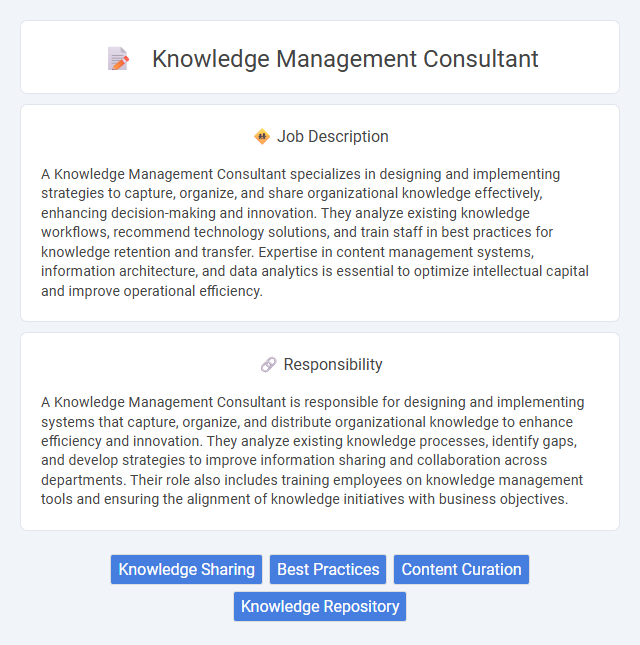
A Knowledge Management Consultant specializes in designing and implementing strategies to capture, organize, and share organizational knowledge effectively, enhancing decision-making and innovation. They analyze existing knowledge workflows, recommend technology solutions, and train staff in best practices for knowledge retention and transfer. Expertise in content management systems, information architecture, and data analytics is essential to optimize intellectual capital and improve operational efficiency.
People who enjoy organizing information and have strong communication skills will likely find success as a Knowledge Management Consultant. Those who are adaptable to changing technologies and can work well in collaborative environments will probably be more suitable for this role. Individuals who prefer routine tasks with minimal interaction may find this job less aligned with their strengths.
Qualification
A Knowledge Management Consultant requires expertise in information systems, data analysis, and organizational learning strategies. Proficiency in knowledge management software, strong communication skills, and experience in change management are essential qualifications. Advanced degrees in information science, business administration, or related fields enhance a candidate's ability to optimize knowledge sharing and retention within organizations.
Responsibility
A Knowledge Management Consultant is responsible for designing and implementing systems that capture, organize, and distribute organizational knowledge to enhance efficiency and innovation. They analyze existing knowledge processes, identify gaps, and develop strategies to improve information sharing and collaboration across departments. Their role also includes training employees on knowledge management tools and ensuring the alignment of knowledge initiatives with business objectives.
Benefit
Hiring a Knowledge Management Consultant likely enhances organizational efficiency by streamlining information sharing and reducing knowledge silos. This role probably improves decision-making processes through better access to critical data and expertise. Companies may experience increased innovation potential as knowledge flows become more structured and accessible.
Challenge
A Knowledge Management Consultant is likely to face the challenge of effectively capturing and organizing dispersed information within an organization to enhance accessibility and decision-making. They may encounter difficulties in aligning knowledge management strategies with diverse team workflows and company culture. Overcoming resistance to change among employees could also be a probable obstacle in implementing successful knowledge sharing systems.
Career Advancement
A Knowledge Management Consultant leverages expertise in organizational learning, information architecture, and collaboration technologies to optimize knowledge sharing and retention within companies. Advancing in this career often involves gaining certifications in knowledge management systems, mastering AI-driven data analytics, and developing strategic leadership skills to guide enterprise-wide knowledge initiatives. Progression can lead to senior roles such as Chief Knowledge Officer or strategic advisor, with increased influence over corporate innovation and competitive advantage.
Key Terms
Knowledge Sharing
Knowledge Management Consultants specialize in facilitating effective knowledge sharing across organizations to enhance collaboration and improve decision-making processes. They implement systems and strategies that promote the seamless transfer of expertise, best practices, and critical information among employees and departments. Their role includes designing knowledge repositories, training programs, and communication frameworks that drive continuous learning and innovation.
Best Practices
A Knowledge Management Consultant specializes in designing and implementing strategies that optimize organizational knowledge sharing and retention, leveraging tools like content management systems and collaboration platforms. Best practices include conducting thorough knowledge audits, fostering a culture of continuous learning, and utilizing metrics to measure knowledge flow and impact. This role demands expertise in knowledge capture techniques, stakeholder engagement, and aligning knowledge processes with business objectives to drive innovation and operational efficiency.
Content Curation
A Knowledge Management Consultant specializing in Content Curation develops strategies to organize, filter, and distribute relevant information across an organization, enhancing knowledge accessibility and usability. They leverage advanced content management systems and metadata frameworks to ensure accurate tagging, classification, and retrieval of critical documents and resources. Their expertise drives continuous improvement in knowledge workflows, boosting collaboration and informed decision-making within enterprises.
Knowledge Repository
A Knowledge Management Consultant specializes in developing and optimizing Knowledge Repositories to enhance organizational learning and information accessibility. They implement strategies to structure, categorize, and maintain digital databases, ensuring content is accurate, up-to-date, and easy to retrieve. Their expertise supports improved collaboration, decision-making, and operational efficiency across departments.
 kuljobs.com
kuljobs.com